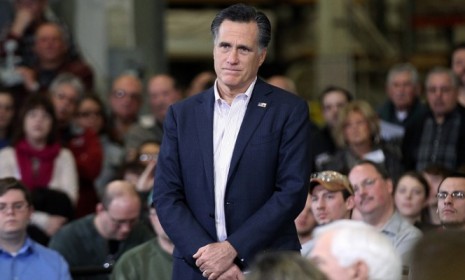Why the GOP race won't end on Super Tuesday
In past elections, presidential frontrunners have clinched the nomination on the biggest day of the primary season. Mitt Romney won't be so lucky

A free daily email with the biggest news stories of the day – and the best features from TheWeek.com
You are now subscribed
Your newsletter sign-up was successful
Historically, Super Tuesday has been the day when many a leading presidential candidate locked up his party's nomination. But that won't be the case this year, experts say, even though Mitt Romney is expected to extend his lead in the GOP delegate hunt as 10 states make their presidential preferences known. Why is the grueling GOP campaign likely to drag on? Here's what you should know:
First off: Who is likely to win Super Tuesday?
The numbers will probably favor the man who's already out front, Mitt Romney. The former Massachusetts governor is expected to win contests in Virginia, Massachusetts, and Vermont. He also has a strong chance to win in Ohio, a crucial general-election swing state where he's running neck-and-neck with his main rival, Rick Santorum. Judging by the last polls before Super Tuesday, Romney is poised to haul in 224 delegates today, says Nate Silver at The New York Times, more than half of the 437 delegates up for grabs. Only about 300 delegates had been allocated in the contests leading up to Super Tuesday.
The Week
Escape your echo chamber. Get the facts behind the news, plus analysis from multiple perspectives.

Sign up for The Week's Free Newsletters
From our morning news briefing to a weekly Good News Newsletter, get the best of The Week delivered directly to your inbox.
From our morning news briefing to a weekly Good News Newsletter, get the best of The Week delivered directly to your inbox.
Won't that make him the presumptive nominee?
Not necessarily. The other three candidates will pile up delegates, too. Rick Santorum, the odds-on favorite in Oklahoma, looks likely to snare in the neighborhood of 75 delegates, while Newt Gingrich could pick up roughly 90, thanks mostly to an expected win in his home state, Georgia. And Rep. Ron Paul could pick up his first victory in the Alaska caucuses, helping him collect 25 delegates. The four-way split would give everyone a share of the Super Tuesday prize, and fresh reasons for staying in the race.
Why is Super Tuesday so inconclusive this year?
For one thing, the GOP decided to spread out its calendar, pushing some big contests later in the primary season. The party also ordered states to award delegates according to each candidate's share of the vote instead of giving the whole pot to the statewide winner. That proportional allocation makes it mathematically difficult for Romney to amass the 1,144 delegates he needs to seal the nomination until late May at the earliest.
A free daily email with the biggest news stories of the day – and the best features from TheWeek.com
Any other reasons?
Yes. With deep-pocketed super PACs behind them, Gingrich and Santorum can remain competitive with the better-financed Romney campaign well into the spring, if they choose. And Paul could be in for a boost in March thanks to a flurry of caucuses, where his energized supporters tend to show up in disproportionate numbers.
Does that make Super Tuesday meaningless?
Of course not. But at the same time, it's certainly not the deciding factor it often has been in past presidential cycles, says Peter Hamby at CNN. In the end, expect Super Tuesday to "harden the emerging outlines of the Republican race." Actually, Super Tuesday might settle more than you think, says Michael A. Memoli at the Chicago Tribune. While Romney can't officially clinch the nomination, he "can effectively put the contest out of reach" for everyone else if he takes a big majority of delegates. Up to now, everyone has been talking about which candidate has the momentum, say Michael Falcone and Amy Walter at ABC News. But in the delegate hunt, "math trumps momentum" every time.
Sources: ABC News, Chicago Tribune, CNN, NY Times (2), Wash. Post